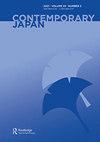The capitalist realism of the 2020 Tokyo Olympic games
引用次数: 0
Abstract
ABSTRACT This article explores how the International Olympic Committee (IOC) prioritised the hosting of the Olympic Games during the COVID-19 pandemic. Without doubt, the prioritisation of hosting the Olympic Games during the pandemic here substantiates what literary critic Mark Fisher has called 'capitalist realism'. This concept refers to a worldview that holds that there is no other way than capitalism for the society in which we live. I argue that the Olympic Games are a symbol of capitalist realism. To make this argument, I first summarize Fisher’s concept of capitalist realism and Jules Boykoff’s (2020) arguments that the Olympic Industry is first and foremost about perpetuating capitalism in the form of ‘celebration capitalism’. Following this, I describe how a 'new lifestyle’ or ‘new normal' has been imposed by the state and used to create a setting for holding the postponed Olympics in its entirely 'perfect form'. Next, I discuss the role of neoliberalism in facilitating a paradoxical relationship between the state and private industry. Building from this, I suggest that the relationship between new ways of life, celebration capitalism and neoliberalism is a constitutive part of capitalist realism aimed at ensuring the rule of capital at any cost, as demonstrated by the IOC's running of the Olympics despite the COVID-19 epidemic. At the same time, the running the Games also empowered the Japanese government to create a state of exception that enables them to pursue economic and political goals with unprecedented freedom by simultaneously circumscribing the freedom of its citizens.2020年东京奥运会的资本主义现实主义
本文探讨了国际奥委会(IOC)在2019冠状病毒病大流行期间如何优先举办奥运会。毫无疑问,在疫情期间优先举办奥运会证实了文学评论家马克·费舍尔所说的“资本主义现实主义”。这个概念指的是一种世界观,认为除了资本主义,我们生活的社会没有其他出路。我认为奥运会是资本主义现实主义的象征。为了提出这一论点,我首先总结了Fisher的资本主义现实主义概念和Jules Boykoff(2020)的观点,即奥林匹克产业首先是关于以“庆祝资本主义”的形式使资本主义永续下去。接下来,我描述了一种“新生活方式”或“新常态”是如何被国家强加的,并被用来为推迟举办的奥运会创造一个完全“完美的形式”。接下来,我将讨论新自由主义在促进国家和私营企业之间矛盾关系中的作用。基于此,我认为,新生活方式、庆祝资本主义和新自由主义之间的关系是资本主义现实主义的组成部分,其目的是不惜一切代价确保资本的统治,正如国际奥委会在2019冠状病毒病流行的情况下举办奥运会所证明的那样。与此同时,举办奥运会也赋予了日本政府创造一种例外状态的权力,使他们能够以前所未有的自由追求经济和政治目标,同时限制其公民的自由。
本文章由计算机程序翻译,如有差异,请以英文原文为准。
求助全文
约1分钟内获得全文
求助全文

 求助内容:
求助内容: 应助结果提醒方式:
应助结果提醒方式:


